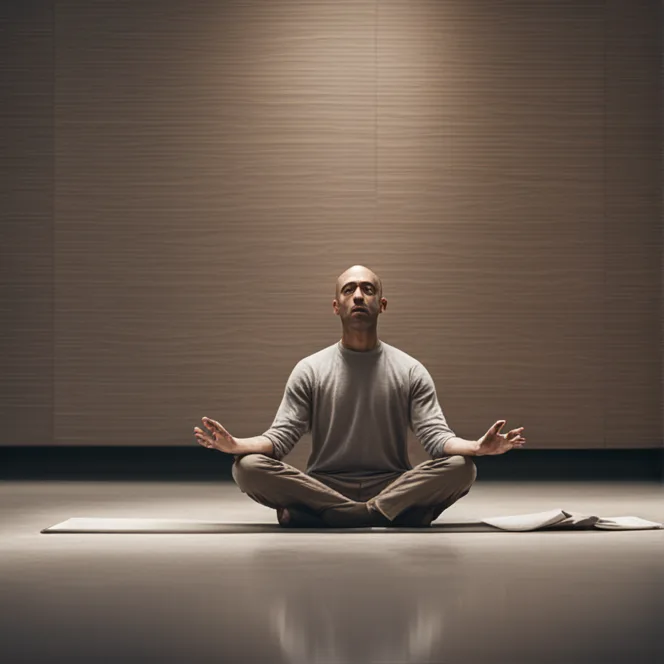
Mindfulness vs. Meditation: Key Distinctions
Explore the nuances between mindfulness and meditation to enhance your spiritual and mental well-being.
article by Hina Kurosawa
The Genesis of Mindfulness and Meditation
Mindfulness and meditation are often mentioned in the same breath, yet they present unique approaches to fostering mental clarity and emotional health. The origins of mindfulness stretch back thousands of years, intertwined with spiritual practices that encourage a focus on the present moment. Rooted in Buddhist traditions, mindfulness is integral in the journey towards enlightenment. Meditation, while often associated with these same traditions, encompasses a broader spectrum of practices, from specific concentration techniques to transcendental experiences. Despite their shared history, mindfulness and meditation have evolved into distinctive practices that serve different but complementary purposes in enhancing one's spiritual journey.

Defining Mindfulness
Mindfulness is the art of remaining fully aware of our experiences in the present moment, with a non-judgmental and accepting stance. It's about noticing thoughts, feelings, sensations, and the surrounding environment without criticism or distraction. This mental state can be cultivated during any activity, from the mundane to the complex. Whether one is washing dishes, walking in a park, or confronting a stressful scenario, mindfulness calls one to approach these instances with full attention and openness. The practice of mindfulness can help in reducing stress, improving emotional regulation, and fostering a deeper appreciation for life.

Understanding Meditation
Meditation, on the other hand, typically involves setting aside specific time for quiet reflection or mental exercise. The techniques can vary widely, from focusing on the breath or a mantra to engaging in a guided visualization or body scan. Meditation can induce a deep state of relaxation and may lead to profound insights and inner tranquility. Regular meditation practice has been shown to decrease anxiety, lower blood pressure, and benefit overall mental health. While meditation often includes elements of mindfulness, it is generally a more structured approach to training the mind.

Mindfulness in Daily Life
The practice of mindfulness integrates seamlessly into daily life and is not confined to a time or space. It encourages an engaged and open-hearted attention to life as it unfolds. By practicing mindfulness, individuals can shift their relationship to their thoughts and feelings, often leading to reduced impact from negative patterns. The beauty of mindfulness lies in its accessibility; it can be practiced at any moment and requires no special equipment—just a willingness to bring one's focus to the now.

Meditation as a Formal Practice
Meditation often requires a designated setting and period. It asks practitioners to step back from the rush of daily routines and dedicate themselves to contemplation or mindfulness with greater depth and discipline. For some, meditation may involve attending a class or sitting in a quiet space for a designated period. This structured practice creates a foundation that can support the more spontaneous practice of mindfulness throughout other areas of life.
The Interplay Between Mindfulness and Meditation
While different, mindfulness and meditation are not mutually exclusive; rather, they support and enhance each other. Regular meditation can deepen one's mindfulness practice, enabling a greater ease of mind and emotional balance that extends beyond the meditation cushion into everyday experiences. Mindfulness, practiced diligently, can make meditation sessions more profound as the practitioner becomes adept at noticing subtleties of thought and sensation without attachment.
Choosing Your Path
Ultimately, each individual must decide what balance of mindfulness and meditation best serves their needs. Some may gravitate towards the immediate accessibility of mindfulness, while others may cherish the dedicated solitude that meditation offers. Many will find a combined approach most beneficial, using meditation to cultivate a mind capable of being mindful throughout the chaos and beauty of life.
Published: 12/13/2023
Modified: 12/14/2023
More predictions
Come back here soon to learn more about yourself and your future


Mindfulness In CBT: A Synthesis For Healing
Explore the powerful combination of mindfulness and cognitive-behavioral therapy (CBT) to enhance mental wellness and emotional balance.


Mindfulness & Meditation: What Sets Them Apart
Delve into the distinction and relationship between mindfulness and meditation in our comprehensive exploration.


The Alchemy Of Mindfulness Art
Uncover the serene connection between mindfulness and art, exploring how creativity enhances inner peace and self-awareness.